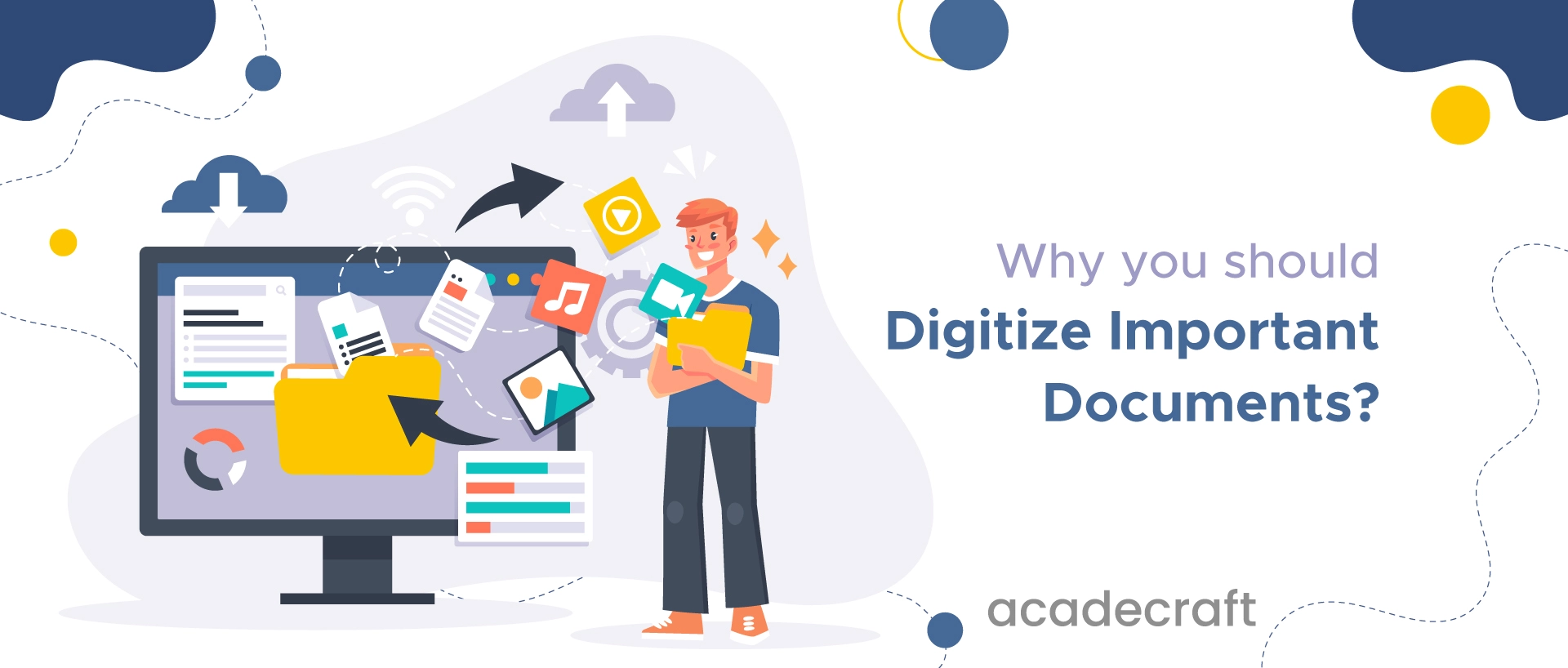
Important documents are often vulnerable to physical damage, loss, or theft. Knowing the importance of digitization of records provides a secure and reliable way to preserve and access important information. Gone are the days of overflowing file cabinets and the struggle to locate essential documents in a sea of paper. Instead, a paradigm shift towards digital record-keeping is reshaping the way we store, access, and secure our most critical information.
This article explores the intriguing reasons for embracing digitization, shedding light on the advantages it offers to individuals and organizations alike. From improved accessibility and heightened security to eco-conscious practices and enhanced collaboration, the journey of digitizing important documents is not just a technological trend but a strategic move towards a more organized, efficient, and sustainable future.
The importance of digitizing records cannot be overstated in today's digital age. This transformational process involves converting physical documents, such as paper files, into digital formats that can be stored and accessed electronically. In this section, we'll explore the significant reasons why digitizing records is important.
It eliminates the need for physical file transfers or waiting for updates, ultimately improving the speed and accuracy of decision-making. With streamlined collaboration, healthcare providers can work together seamlessly, ensuring the best possible care for their patients.
Bonus Read: Top 5 Benefits of Book Digitization for Publication Houses
While the advantages of digitizing records are well-known, several hidden benefits may not be immediately apparent but are equally valuable. Let us explore the advantages of digitization of records:
|
Preservation of Fragile Documents: |
Digitizing allows for the preservation of fragile and aging documents. Old paper records can deteriorate over time, but by digitizing them, you can ensure their long-term survival and accessibility. For example, a historical archive that houses centuries-old manuscripts and fragile photographs can digitize these artifacts to protect them from physical degradation. It not only preserves the cultural heritage but also allows researchers and scholars worldwide to access and study these valuable resources without causing further damage. |
|
Efficient Document Retrieval: |
Beyond the obvious benefit of accessibility, digitization enables efficient document retrieval. Optical character recognition (OCR) technology allows you to search through large volumes of text, making it easier to find specific information within documents. Instead of manually searching through physical copies of documents, using technology saves time and effort. Additionally, digitization allows for the creation of backups and multiple copies, reducing the risk of losing important information due to damage or natural disasters. |
|
Enhanced Data Analytics: |
Digital records are amenable to data analytics. By digitizing your records, you can gain insights from the data contained within them, uncovering trends and patterns that may have otherwise remained hidden. These insights can help inform decision-making and improve overall business performance. Moreover, digital records can be easily integrated with other software and systems, enabling seamless data analysis and integration across different departments or functions within an organization. |
|
Disaster Recovery and Business Continuity: |
In case of a catastrophe, having digital records is essential for the continuity of your business. These records can be conveniently backed up and stored off-site, ensuring that your essential data is safeguarded and can be swiftly retrieved. For example, in the case of a fire or flood that destroys a physical office space, having digital records allows employees to continue working remotely and access important information from any location. It not only minimizes downtime and loss of productivity but also ensures that essential business operations can continue without interruption. |
|
Reduced Risk of Data Loss: |
While physical documents can be lost or destroyed, digital records can be safeguarded with redundancy. It reduces the risk of data loss and ensures that your information remains intact. Digital records can be backed up and stored in multiple locations, such as on the cloud or external hard drives. This redundancy means that even if one copy of the digital records is lost or damaged, there are additional copies that can be accessed and restored. It significantly reduces the risk of permanent data loss and provides peace of mind for businesses. |
|
Space for Innovation: |
By eliminating the need for physical storage, digitization frees up valuable office space that can be repurposed for more innovative and productive uses. For example, businesses can create collaborative workspaces or set up new equipment to support research and development activities. Additionally, digitization allows for easier sharing and collaboration on digital files, promoting a more efficient and dynamic work environment. |
|
Remote Access: |
The ability to access digital records remotely is not only convenient but also essential in today's increasingly mobile and remote work environments. It enables collaboration and productivity from anywhere in the world. Furthermore, remote access eliminates the need for physical presence in the office, reducing commuting time and expenses for employees. This flexibility enables companies to access a global talent pool, allowing for the hiring of the most qualified individuals regardless of their location. |
|
Improved Compliance Management: |
Digital records facilitate compliance management by providing clear audit trails and automating record-keeping processes. It can save time and resources in adhering to regulatory requirements. Additionally, remote access enables companies to easily implement and enforce security protocols and access controls, ensuring that sensitive information remains protected. Furthermore, remote access also enhances disaster recovery capabilities as data and systems can be accessed and restored remotely in the event of a physical office disruption. |
The important digitization of records offers numerous benefits for businesses. It not only simplifies and streamlines record-keeping processes but also improves compliance with regulatory requirements. The ability to remotely access and protect sensitive information enhances overall security measures while also providing a means for efficient disaster recovery. Incorporating our document digitization solutions is essential in today's increasingly digital world, as it allows companies to stay competitive, save resources, and ensure the longevity of their valuable data.
Share